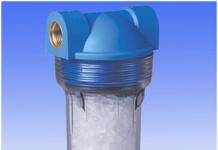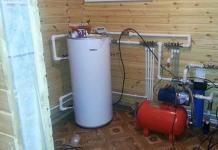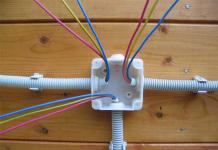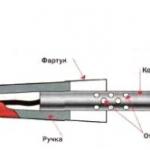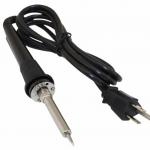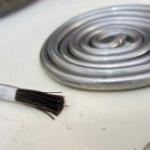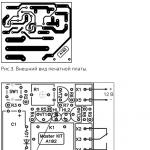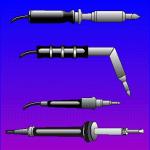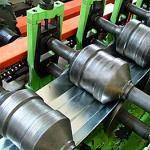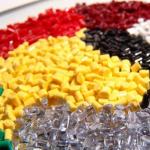Hard water is a serious problem. It leads to a quick breakdown of expensive equipment, therefore, to protect washing machines and boilers, a special polyphosphate filter for water softening is recommended for installation.
When passing through its filler - sodium polyphosphate, water is freed from impurities that lead to the formation of scale.
The principle of operation of the polyphosphate filter for water softening
The design of the filter is quite simple.
It consists of the following components:
- transparent flask,
- lid,
- plum,
- polyphosphate salt crystals.
The principle of operation of the device is as follows: water, passing through the crystals, is saturated with sodium polyphosphates, and a film is created that envelops hard salts, so scale does not form on the heating elements. Water after passing through such a filter becomes technical and cannot be used for drinking.
There are several filter modifications on the market - capsules can be poured into a separate container or placed directly inside the equipment. Structurally, the devices can be direct-flow or presented in the form of dosing filters.
Should I install a polyphosphate filter?
If you do not install a polyphosphate filter, the heating elements will not only fail, but the valves of household appliances will also begin to scale up.
This will lead to the fact that the equipment will spontaneously draw water, the water heating rate will drop, and electricity consumption will increase. All this sooner or later will cause a breakdown of expensive equipment.. The filter will also eliminate the need for constant cleaning of the valves of washing machines.
Another useful property of the device is the ability to dissolve already formed scale layers. And the softer the water, the less detergent is required for laundry or dishwashing.
Why You Shouldn't Drink Water After a Salt Filter
Polyphosphate filters are designed to purify only technical water for one simple reason - polyphosphate is a toxic substance. Moreover, at water temperatures above 40C, polyphosphates are destroyed and become ineffective.
Install this water purifier for domestic purposes only!
VIDEO INSTRUCTION
How often to change and clean the polyphosphate filter
Filler consumption is quite economical - 3 grams per 1000 liters. As you use the crystals dissolve, so they need to be refilled periodically.
Manufacturers recommend completely replacing the contents of the flask if the volume of crystals in it has decreased by exactly half, or if the filling of the flask has not changed over a long period. On average, as practice shows, the service life of the device is about six months.
The device is installed directly in front of the boiler and household appliances. In the pipe, it is necessary to draw a conclusion for equipment with a crane, then install a filter and then connect the equipment itself. It can also be installed directly into the hose, from where water will flow into the boiler or washing machine.
Before installation, the polyphosphate filter must be washed. This can be done with running water under a regular faucet. . This is necessary in order to remove small crystals that can pass through the hose and clog the filter in the valve of the washing machine or dishwasher.
What to buy - rating
1. Geyser 1PF is a domestic polyphosphate filter designed to protect boilers, washing machines, dishwashers from hard water. It reduces the amount of lime deposits, extends the life of the equipment, helps to reduce the need for detergents.. Due to the transparency of the case, it is easy to control the contents.
The cost is from 250 rubles.
2. Aquaphone Styron - a polyphosphate filter from the Russian brand Aquaphor. Well proven in protection against scale washing machines and dishwashers. Completely replaces any powder descalers. Mounted between the water supply pipe and the equipment itself. Connection dimensions are standard, so adapter rings are not required for installation . Filling is enough for 300 washes.
The cost is from 300 rubles.
3. Filter-dispenser WFST, BEST-2 - produced by the Polish company USTM. Protects heating elements of household appliances from clogging and scale. To be installed between the faucet and the water supply hose to the washing machine or dishwasher. The volume of the filler is 100 g, which is enough to purify 20 thousand liters of water.
The cost is 306 rubles.
- ATMOR ATP - Israeli-made products. Reliable and easy to operate and install. Contains high quality sodium polyphosphate crystals . Buyers highlight the excellent build quality and the materials themselves.
The cost is from 300 rubles.
Why do you need a polyphosphate filter for a washing machine and boiler
-
While I have my eye on this filter with polyphosphate backfill http://www.eldorado.ru/cat/detail/71043958/ it is placed in front of a washing machine or dishwasher and, as they say, it completely protects against scale for about six months ... then the backfill is added and the process goes on .
The need for any kalgons disappears.
Backfilling in M Video costs 800 rubles per 1 kg, probably enough for three years.
There is also a more serious option for a SL 10 format flask http://www.eldorado.ru/cat/detail/71007405/ lasts for a year, filling can also be added..
Actually the question is: Message from
Viktor74
Today I bought a reverse osmosis filter for water in the kitchen, in parallel I monitored the topic of water softening for a washing machine and a boiler in the store ...
While I had my eye on this filter with polyphosphate backfill
http://www.eldorado.ru/cat/detail/71043958/
it is placed in front of a washing machine or dishwasher and, as they say, it completely protects against scale for about six months ... then the backfill is added and the process goes on.
The need for any kalgons disappears.
Backfilling in M Video costs 800 rubles per 1 kg, probably enough for three years.
There is also a more serious option for an SL 10 flask
http://www.eldorado.ru/cat/detail/71007405/
enough for a year, filling can also be added ..
Actually the question is:
Has anyone used these things and is there any real benefit from them??
Take it and use it .... there will be no harm for water heating elements with a small flow!!! BUT!!! absolutely not for drinking purposes!!!
PS. ... polyphosphate will gradually dissolve - which will be visually visible in a transparent flask - you can refill it ...
ZYY. … a firm believer in ion exchange resins to “soften” water…Who is this genius??? Let me shake his throat!
I have never met a single machine that has died from scale. Siemens, bought in 98, lived for 10 years and was thrown out due to the fact that the powder tray collapsed, the brandt's belt was torn, they didn't follow it once, a large stone hit the drum (one of the small ones put it in) - bent the drum, the typewriter was about 7 years old, sent to the trash, the power board died in the candi. LG, Atlanta both worked and work. IMHO, that calgon, that water softening filters are a waste of money. Calculate how much money it will take for this business in 3-4 years, it will be easier to buy a new machine, unless you bought some expensive miele (I don’t know what it is for, I don’t know), because besides scale there are a lot of other possible reasons for a breakdown are usually more likely
And then another moment - do you often wash at temperatures above 60 degrees? As far as I remember, there were only a few such cases, rarely what things can and should be washed with boiling water, and at a lower temperature, deposits of insoluble salts form much more slowly. And if you really need to soften the water cheaply - there is soda ash, in fact the same advertised calgon, only almost for nothing.
Last edited by wizard_s; 03/25/2011 at 23:07.
well, in principle, the money is small (about 500 rubles a year) it definitely won’t be worse, if only it was good :)
well, God bless her, with the machine ... but the boiler?
how to protect it from scale?
the flow gas heater lasted me for three years, then temperature jumps and a decrease in productivity began.
I installed a storage gas boiler for 115 liters, worked for 2 years, everything was fine, but water hardness is not good for him.
wizard_s I completely agree. I saw dismantled cars, I didn’t see scale, as in advertising. But if it does form, you can change ten
But the boiler is really killed by hard water
in Electric Bolers there are magnesium electrodes from scale, it is recommended to change it at least once every two years, I have never installed Geyser filters, they are not easy to install, I put New Water filters. There is no definite answer for water softening, more important is the purification of water from mechanical impurities, cartridges 1-5 microns can cope with this.
P.S. professionally engaged in plumbing, sewerage, heating
HONDA ODISSEY RA6 2001
and in the powders now there is already an additive for softening, it is written on them that you do not need to add anything.
Don't get it unnecessarily
Do not remove without honor.
Message from
colliodine chemistry brothers to help you
tell us about it, maybe we can learn something
HONDA ODISSEY RA6 2001
SPS Techexpert, Guarantor, Chief Accountant. Demo access for free
Message from
Viktor74
Actually the question is:
Has anyone used these things and is there any real benefit from them??
Judging by the technical descriptions and the price, is this product positioned on the market as a universal one?
I read it and suddenly remembered about the mineral water. Recently bought a 5 liter bottle purified drinking water in the Magnit chain of stores. I boil. In the kettle on the water, there is a plaque like such films.
My tap water is soft.. Only in it there is a suspension of clay. Virtually no carbonate deposits
. There are no such films described above either.
I compare and slowly begin to suspect that there is no universal technology for water purification from organic, colloidal, chemical impurities and bacteria. Each impurity is purified according to its technology.
- organic matter and fine suspensions are purified by filtration or settling or removal from the sediment (mud, algae, clay, .... yeast.)
- chemical "neutralize" reagents
- biological pollution is cleaned by chlorination, ozonation, etc.
What you can be sure of is that any filter has a performance limit.. The higher the cleaning rate, the lower the water quality. That is why all city water treatment plants thresh and accumulate it in special containers for a whole day.
. All this water will be consumed by the population during several evening hours (the so-called consumption peak). But it's all about drinking water.
But the water in the city boiler houses doesn't matter prepare in advance. The reason is the irreversible decomposition of soluble impurities during heating and their transformation into insoluble. See the chemical table of the solubility of metal salts.
Victor, decide on the chemical analysis of water in the SES laboratory. Maybe they can suggest something? Unless, of course, they are "in the share"
.
But how polypropylene pipes and a cesspool behave as a result of using the proposed polyphosphate balls can be guessed at. I can assume that there are no side chemicals in the copper pipe. reactions will not occur.
PS In Chelyaba at the exhibition I saw the technology of purification and "softening" of water with the help of magnetic fields - exotic.
Have a nice day, everyone!
I want to clarify this. Everyone has long known about the dangers of phosphate powders.. But there is such a thing with polyphosphate salt, which is put on the pipe in front of the washing machine to soften the water and reduce scale. We once installed one, and now it suddenly dawned on me: the powder is bio, but we pour polyphosphates into the sewer anyway?
The composition of the polyphosphate salt:
P2O5 - phosphoric anhydride, when interacting with an excess of warm water, it instantly turns into phosphoric acid
Na2O - sodium oxide
Pb - water does not affect lead
As - arsenic itself is not poisonous, but all its water-soluble compounds are extremely poisonous
NaCl - table salt
Na2SO4 - sodium sulfate, one of the main components of synthetic detergents
F- fluorine is not found in free form in nature
Fe2O4 - iron oxide, magnetite - abrasive material used for grinding stone
Ca - due to its high chemical activity, calcium occurs in nature only in the form of compounds
Zn - the earth's crust contains zinc in the form of the mineral spharelite (zinc blende) ZnS
Cu - water does not affect copper, the largest copper nugget was found in one of the Great Lakes, weighed 420 tons.
Cd - cadmium is not found in free form in nature (taken from here) And what happens? Under the guise of protection, washers sell some kind of muck? (Well, that's not surprising, of course...).
And another question for everyone who uses bio-powders. What preventive maintenance against scale in the washing machine do you carry out?
Thanks to all!
Oksana Levina
4 weeks ago
Hi all!
The hard water house has a gas boiler and a washing machine. One water treatment company advised me to buy a polyphosphate filter.
. But as I was told that it is forbidden to drink water after these polyphosphates, only for those. needs! Is it so? Is it really harmful to health or can the same filter be installed on the water supply (boiler)? I ask for your comments and feedback.
Thank you!
Positive points:
- If the device is correctly installed and all installation requirements are taken into account, the optimal ratio of the magnetic field to water quality is reached, then it works for a long time and reliably
- The filter is safe for nature and humans
- Does not require filler replacement
Negative points:
- High requirements for installation by a highly qualified specialist. It is necessary to accurately calculate the distance to the protected equipment, taking into account the flow rate and the chemical composition of the treated water.
Polyphosphate filter: description, characteristics, types and reviews
Important
Polyphosphates instantly begin to replace each other, enveloping hard salts, as a result of which the process of scale formation slows down. Types The modern market provides consumers with a huge selection of water treatment devices.
Info
The filler can either be poured into a separate capsule through which water will pass, or put into the technical device itself. By design, cleaning systems are divided into:
- Flowing.
- Dosing filters.
Installing a filter The consumer does not always purchase and install a cleaning system together with a water heating device.
Often a water heater, boiler, washing machine or dishwasher is used without additional filtering of the incoming water.
Polyphosphate filters
As a rule, without additional replacement of the cartridge, the maximum service life is about six months. The film that forms during the chemical reaction quickly dissolves under the influence of hot water.
Accordingly, when choosing a washing mode, water heating should be no more than 55 degrees. It is also worth taking into account the fact that with the active use of a polyphosphate filter, deposits of calcium and other salts can form on the sides.
Unfortunately, getting rid of them is not so easy. Leaving them on the surface of the boiler or washing machine is also not recommended, because if the layer becomes too large, this will adversely affect the operation of the device.
Polyphosphates (e452)
To combat scale, the following filters and installations are used:
- Magnetic water filters
- Water softening plants
- Polyphosphate filters
- New generation filters TM "Aquarus"
Analysis of the effectiveness of existing means for protection Features and characteristics Filter polyphosphate Filter magnetic Filter "Aquarus" Water softening installation 1 500 Unlimited from 8 000 to 540 000 Specified by the passport Water after passing through the filter is hypoallergenic In the water after treatment, you can swim 100% water treatment efficiency Safety for the mucous membrane Safety for the skin The active substance is easily rinsed out from the surface of the laundry Safe for nature.
Which filter to choose?
It is also important to note that polyphosphate water filters with a large storage capacity and salt content should never be used to purify drinking water or for prolonged contact with the skin. Is the filter harmful to health It is important to understand that the water that is purified with such a filter becomes technical, and it should not be used for drinking or cooking.
Speaking about how harmful such a filter is to health, one thing can be said: it is undesirable to use it for direct use, since it is a chemical reagent, respectively, it is simply impossible to drink water from under such a filter. However, if you put your hands into it if necessary, then a chemical burn will not occur due to the low concentration.
To ensure maximum protection for expensive equipment, it is recommended to periodically check the amount of reagent.
And after another month, you can be left without a washing machine, which at current prices already costs much more. That is, on the one hand, the harm of hard water for human life is authoritatively presented.
Attention
Rigidity does no less harm to large industrial production. Calcium, that magnesium, are forming for very important minerals in water.
With a deficiency in water, a person does not receive the elements necessary for life, various diseases begin to develop. That is, rigidity has its pros and cons. The table shows the consequences of both an excess and a lack of hardness in water. It turns out that the amount of hardness in water is a very serious parameter. And to allow it to be skewed in any direction will mean harm to health, to technology. Every consumer needs to understand that the lime method of water softening is harmful not only for equipment. But also for health.
Is a polyphosphate filter harmful to humans?
Studies show that an element that is found in small amounts in the human body and even participates in important processes in it is still not completely safe. As a water softener, anti-corrosion agent, fertilizer and anti-scale agent, polyphosphates are used much more frequently today. When buying products, it will not be superfluous to carefully study the composition indicated on the package for the presence of a component with the code E452 in it - if it is found, the consumer will most likely be able to find an alternative that is safer for his own health.
With chemical softeners, you need to clearly know the dose and do not add funds to the water yourself. You need to act strictly according to the instructions, because. an overdose of such drugs leads to other negative consequences.
Only now it is much more difficult to remove it, because it is not known how and to what such a coating reacts. One of the most used softening methods today is ion exchange.
The basis is a cationic resin capable of changing ions. Upon contact with hardness, the sodium from the resin is swapped with hardness salts.
The consumer receives soft water enriched with sodium. And the cartridges are gradually clogged with salts, after which they can be thrown away.
The cost of replacing or restoring these cartridges is the main disadvantage of this softening method. Restoration results in very salty waste that needs to be processed for disposal.
Before purchasing a filter, it is important to clearly understand for which device it will be used in the future. Since each device has its own separate modification.
Today's models can contain both granular filler and powder. Principle of operation Unfortunately, in many regions of our country it is not possible to use tap water in its original form. Often, the content of heavy metals and phosphates is exceeded in its composition. To preserve the health of consumers, water undergoes multi-level purification. Speaking about the indicator of water hardness, it is worth noting that it does not cause any harm to humans. But for technical devices, water, the hardness of which is too high, can be a fatal cause of failure. When water enters the polyphosphate filter, it passes through the sodium salt filler.
As a result, a film is formed that prevents the formation of carbonate compounds in the form of scale. Positive points:
- The most common method of descaling washing machines
- Availability of a large number of offers from various manufacturers
- Availability of the offer - the ability to buy in any plumbing store
- Relatively low cost
- Possibility of purchasing a filler to replenish the filter
- The filter is easily installed without the use of special tools and services of a wizard
Negative points:
- Low resource and service life (up to 6 months)
- The need to control the presence of backfill in the filter
- Water after the filter cannot be heated above 55ºС.
Therefore, after purchasing a polyphosphate filter and installing it, it is necessary to descale the heating elements using special chemical compounds. As cleaning agents for a water heater or boiler, non-abrasive solutions are suitable, which are purchased together with flushing fluids and connected to a heat exchanger. Under the influence of high temperatures, the reagent begins to act and has a destructive effect on scale. After the liquid must be drained, the device and the heat exchanger should be washed, and the structure should be disconnected from the heater. After the installation of the cleaning device itself. The method is determined depending on the type of device with which the system is used. For example, a polyphosphate filter for a washing machine is attached to the inlet hose. The same system is used to purify water for boilers.
Polyphosphate filter: description, characteristics, types and reviews
Another useful property of the device is the ability to dissolve already formed scale layers. And the softer the water, the less detergent is required for laundry or dishwashing.
Why you can not drink water after a salt filter Polyphosphate filters are designed to purify only industrial water for one simple reason - polyphosphate is a toxic substance. Moreover, at water temperatures above 40C, polyphosphates are destroyed and become ineffective.
Install this water purifier for domestic purposes only! How often to change and clean the polyphosphate filter Filler consumption is quite economical - 3 grams per 1000 liters. As you use the crystals dissolve, so they need to be refilled periodically.
Why do you need a polyphosphate filter for a washing machine and boiler
Manufacturers recommend completely replacing the contents of the flask if the volume of crystals in it has decreased by exactly half, or if the filling of the flask has not changed over a long period. On average, as practice shows, the service life of the device is about six months.
The device is installed directly in front of the boiler and household appliances. In the pipe, it is necessary to draw a conclusion for equipment with a crane, then install a filter and then connect the equipment itself.
It can also be installed directly into the hose, from where water will flow into the boiler or washing machine. Before installation, the polyphosphate filter must be washed.
This can be done with running water under a regular faucet. This is necessary in order to remove small crystals that can pass through the hose and clog the filter in the valve of the washing machine or dishwasher.
Polyphosphate filter for the boiler and washing machine, the benefits and harms of the installation
If less than half is left, then it is best to completely replace the composition. Otherwise, the degree of protection begins to weaken.
Turning to specialists for advice, it can be said that it is best to use a powder reagent to ensure safe operation. It actively fights not only scale formation, but also corrosion, which often affects heating elements.
If the affected area becomes too large, this may lead to the need for a complete replacement of the heating elements of the equipment. Conclusion Polyphosphate filters are the best option for protecting household appliances from scale. They are affordable and easy to install.
Forum of chemists
Info
It is also important to note that polyphosphate water filters with a large storage capacity and salt content should never be used to purify drinking water or for prolonged contact with the skin. Is the filter harmful to health It is important to understand that the water that is purified with such a filter becomes technical, and it should not be used for drinking or cooking.
Attention
Speaking about how harmful such a filter is to health, one thing can be said: it is undesirable to use it for direct use, since it is a chemical reagent, respectively, it is simply impossible to drink water from under such a filter. However, if you put your hands into it if necessary, then a chemical burn will not occur due to the low concentration.
To ensure maximum protection for expensive equipment, it is recommended to periodically check the amount of reagent.
Polyphosphate filters
Tap water in each region has its own hardness index. And the softer the water, the less scale remains on the heating elements of household appliances, such as an electric kettle, washing machine, heating boiler, etc. To reduce the amount of nitrates and extend the life of expensive equipment, it is recommended to use special protective systems. Polyphosphate filters are popular fighters against the formation of scale and other chemical deposits on important elements and components of water heating equipment. According to experts, equipment that is used in conjunction with cleaning devices requires repair much less frequently than devices that use untreated tap water. Appointment and application First of all, it is worth noting that polyphosphate filters are used everywhere and are quite affordable for purchase.
Forum
Most importantly, apart from the periodic replacement of the crystals themselves, no additional care is required for the device. The device reduces the rate of scale formation, thereby preventing the breakdown of components and heating elements, which are often caused by scale formation.
The polyphosphate filter for the boiler, according to user reviews, is the most affordable option for purifying water and extending the life of the equipment. What the design consists of The polyphosphate filter itself has a simple design:
- Lid.
- Main flask.
- Drain.
- Filler.
The whole process begins with water entering through the cover, and passing through the filtration, it exits through the drain and enters the water heating equipment.
Polyphosphate filter for softening water in the heating system
As a rule, without additional replacement of the cartridge, the maximum service life is about six months. The film that forms during the chemical reaction quickly dissolves under the influence of hot water.
Accordingly, when choosing a washing mode, water heating should be no more than 55 degrees. It is also worth taking into account the fact that with the active use of a polyphosphate filter, deposits of calcium and other salts can form on the sides.
Unfortunately, getting rid of them is not so easy. Leaving them on the surface of the boiler or washing machine is also not recommended, because if the layer becomes too large, this will adversely affect the operation of the device.
Polyphosphate water softeners
Polyphosphates instantly begin to replace each other, enveloping hard salts, as a result of which the process of scale formation slows down. Types The modern market provides consumers with a huge selection of water treatment devices. The filler can either be poured into a separate capsule through which water will pass, or put into the technical device itself. By design, cleaning systems are divided into:
- Flowing.
- Dosing filters.
Installing a filter The consumer does not always purchase and install a cleaning system together with a water heating device. Often a water heater, boiler, washing machine or dishwasher is used without additional filtering of the incoming water.
Polyphosphate filters for water softening…
Hard water is a serious problem. It leads to a quick breakdown of expensive equipment, therefore, to protect washing machines and boilers, a special polyphosphate filter for water softening is recommended for installation. When passing through its filler - sodium polyphosphate, water is freed from impurities that lead to the formation of scale.
The principle of operation of the polyphosphate filter for water softening The design of the filter is quite simple. It consists of the following components:
- transparent flask,
- lid,
- plum,
- polyphosphate salt crystals.
The principle of operation of the device is as follows: water, passing through the crystals, is saturated with sodium polyphosphates, and a film is created that envelops hard salts, so scale does not form on the heating elements.
Is it possible to drink water after a polyphosphate filter
What to buy - rating 1. Geyser 1PF - domestic polyphosphate filter, designed to protect boilers, washing machines, dishwashers from hard water. It reduces the amount of lime deposits, extends the life of the equipment, helps to reduce the need for detergent consumption. Due to the transparency of the case, it is easy to control the contents. The cost is from 250 rubles. 2. Aquaphone Styron - a polyphosphate filter from the Russian brand Aquaphor. Well proved in protection against a scum of washing machines and dishwashers. Completely replaces any powder descalers. Mounted between the water supply pipe and the equipment itself. Connection dimensions are standard, so adapter rings are not required for installation. Filling is enough for 300 washes. The cost is from 300 rubles. 3. Filter-dispenser WFST, BEST-2 - produced by the Polish company USTM.
Tokashi wrote: So I'm trying to understand whether the manufacturer is cunning, or I don't understand something? This method has long been used at CHPPs to prevent the formation of calcium scale and maintain the optimal pH and alkalinity of boiler water from the point of view of corrosion, treatment with trisodium phosphate (Na3PO4) mixed with alkali (NaOH) is used. Trisodium phosphate in an alkaline medium forms hydroxylapatite (Ca10(PO4)6(OH)2) with calcium ions, a loose mobile sludge that can be easily removed with blowing.
So this method is used by filter manufacturers. However, it has a lot of shortcomings that negate its effectiveness, for example, under-sludge corrosion; — formation of deposits of iron-phosphate compounds in the zone of increased heat flows, leading to under-sludge corrosion and rupture of screen pipes; — formation of phosphate deposits proper; - the phenomenon of "hiding" salts, i.e.
For quick and effective purification of cold water for domestic use, a polyphosphate filter or a polyphosphate softener is used. The filtration device perfectly protects the equipment from scale, stone deposits, increases the effect of detergents by up to 40%.
Polyphosphate water softeners or, more simply, purification filters are often used to protect household appliances from limescale. The cleaning device is installed in front of the unit, which requires "soft" water. In most cases, the softener is used for dishwashers, washing machines, heating boilers, boilers. Such a filter is very often fixed directly into the hose through which water is supplied to household appliances.

If measures are taken in time by installing polyphosphate water softeners, the device will be reliably protected from scale. As a result, household appliances last much longer and are much easier to care for. Many people know how difficult it is to get rid of a thick layer of scale and how laborious such a procedure can be, so it’s better to take care of home “helpers” in advance. For example, washing in soft water requires less powder and there is no need to use special protective agents against scale. If you install a filter with polyphosphates in front of the washer, then a positive result will not be long in coming. But, if the water hardness in the region of your residence is more than 7 mEq / l., then the softener will not cope with its task.
The structure of the water softener is very simple. The kit includes a plastic flask (usually transparent) filled with crystallized sodium polyphosphate. At the top of the filter there is a hole through which water enters. It passes through the cleaning material and pours out through the opening from below.
Polyphosphate cleaner body
Polyphosphate water softeners are equipped with a “trunk” quite standard for a main filter, consisting of a pair of basic elements: a bulb and a head. There are several options for softeners that are provided for connecting dishwashers and washing units.

Sodium polyphosphate granules are usually located either in the filter housing for cleaning (in the flask). But sometimes they are placed in a special container, which is fixed in the flask as a kind of cartridge.
In addition to this, polyphosphate water softeners are equipped with two types of housings: direct-flow and filters with a dispenser. Dispensers distribute the water flow into two parts, one of which is treated with a reagent. After saturation with a softening agent in a specific proportion, the water returns to the main stream and, according to this scheme, the liquid is softened. In a metering-type filter, sodium polyphosphate is often used in the form of a powder, but there are varieties with granules. There are options for water softeners with a dispenser that allow you to control the level of dissolution or, on the contrary, are designed only for a clearly fixed level.
Polyphosphate backfill
In hard water filter systems, sodium polyphosphate occurs as a translucent granulate, similar to pieces of broken glass, or as a white powder in a compressed state. 
As it has already become clear, sodium polyphosphate, or, as it is also called, Graham's salt, is poured into polyphosphate household water softeners. How does this interesting substance manage to turn "evil" water into "good"? If you explain in simple terms and do not seek help from chemical formulas and reactions, then the filter operates according to the following scheme. Powdered polyphosphate or its granules, dissolves in water, thereby connecting magnesium and calcium ions, and creates a barrier for their precipitation at the time of heating.
I would like to emphasize that calcium and magnesium are not removed from the water, they simply lose their structural strength and can no longer form scale in household units when heated.
Plus, according to manufacturers of softeners, polyphosphate, which dissolves in a liquid, forms a protective layer on the surface in contact with it earlier. The film protects household appliances from the appearance of scale and the development of rust. The scale that appeared before using the filter also disintegrates and is washed out after a while. By the way, experts strongly advise buying polyphosphate water softeners with a filler in the form of a powder, and not with granules. Powdered sodium polyphosphate dissolves much more thoroughly in water and has a stronger effect.
Resource
If we talk about the resource, then in this case there are no unambiguous indicators. For example, not every softener manufacturer can indicate the exact amount of water in the instructions, which is not surprising. Here you need to take into account different levels of water hardness, dosage regimens that differ from each other, and the like. Some companies that specialize in the sale of polyphosphate cleaners advise focusing on the amount of filter medium. If its level in the body has decreased to half, then it is necessary to change the filler. You need to do the same if over the past six months the charge in the flask has completely remained in place.
Where are polyphosphate filters used?
Polyphosphate water softeners are used for domestic water treatment. They reduce water hardness to zero, which has a great effect on the working condition of home appliances (dishwashers, washing machines, gas water heaters and boilers, boilers, etc.). By the way, in most European countries, such filtering dosing devices are designed to purify drinking water. But, this does not mean that such experiments should be carried out in our country. Firstly, it is not known how your body will react to water with a chemical "surprise". And secondly, no one can vouch for the authenticity and normal quality of the reagent in the filter.
Considering the foregoing, it is better to use water softening devices for their intended purpose and install them only in front of household appliances. Unless, of course, you are a fan of exotic drinks or an enemy to your health.
Accordingly, water softening with polyphosphates is not used for drinking water. Given this anti-environmental nuance of polyphosphates, a new generation of anti-scalants have been developed, which eventually break down into components that do not harm the environment. But these substances are quite expensive, for their use you need special dosing equipment (dosing pump) and few people use it in everyday life. The main application is the protection of pipes, heating devices, reverse osmosis membranes. So, chemical reagent methods of water softening are needed mainly for the preparation of exclusively technical water.
Polyphosphate filter: description, characteristics, types and reviews
Before purchasing a filter, it is important to clearly understand for which device it will be used in the future. Since each device has its own separate modification.
Today's models can contain both granular filler and powder. Principle of operation Unfortunately, in many regions of our country it is not possible to use tap water in its original form.
Often, the content of heavy metals and phosphates is exceeded in its composition. To preserve the health of consumers, water undergoes multi-level purification.
Speaking about the indicator of water hardness, it is worth noting that it does not cause any harm to humans. But for technical devices, water, the hardness of which is too high, can be a fatal cause of failure.
When water enters the polyphosphate filter, it passes through the sodium salt filler.
Polyphosphate filter for the boiler and washing machine, the benefits and harms of the installation
Therefore, after purchasing a polyphosphate filter and installing it, it is necessary to descale the heating elements using special chemical compounds. As cleaning agents for a water heater or boiler, non-abrasive solutions are suitable, which are purchased together with flushing fluids and connected to a heat exchanger.
Under the influence of high temperatures, the reagent begins to act and has a destructive effect on scale. After the liquid must be drained, the device and the heat exchanger should be washed, and the structure should be disconnected from the heater.
Attention
After the installation of the cleaning device itself. The method is determined depending on the type of device with which the system is used.
For example, a polyphosphate filter for a washing machine is attached to the inlet hose. The same system is used to purify water for boilers.
Post navigation
With chemical softeners, you need to clearly know the dose and do not add funds to the water yourself. You need to act strictly according to the instructions, because. an overdose of such drugs leads to other negative consequences. Only now it is much more difficult to remove it, because it is not known how and to what such a coating reacts. One of the most used softening methods today is ion exchange. The basis is a cationic resin capable of changing ions. Upon contact with hardness, the sodium from the resin is swapped with hardness salts.
Important
The consumer receives soft water enriched with sodium. And the cartridges are gradually clogged with salts, after which they can be thrown away.
The cost of replacing or restoring these cartridges is the main disadvantage of this softening method. Restoration results in very salty waste that needs to be processed for disposal.
Why do you need a polyphosphate filter for a washing machine and boiler
Is it possible to live your whole life consuming low-quality, or rather hard water? There is no definite answer to this question. If you live constantly with risk, then you can. You can also rely on the well-known Russian maybe.
After all, kidney stones may turn unsuccessfully, or they may not turn. Therefore, water softening methods continue to improve today. Mankind is still looking for effective softening systems. to get soft water at minimum cost. Today, not knowing about the dangers of rigidity means only one thing - the consumer is doing housework. Any hostess knows how many problems it is to remove this annoying limescale from the surfaces of pots and kettles. But besides them, there are devices and more serious. Both washing machines and dishwashers suffer greatly from limescale.
Polyphosphate filters
Yes, and such cartridges cost a decent amount, and you have to change them often. But the quality of softening is one of the best. Ion-exchange methods and electrodialysis stand apart from other softening methods. These methods are engaged in water desalination, including complete. Therefore, the scope of their application is mostly specific, plus all drinking industries.
Electrodialysis supplies such powerful electrical impulses to the water that help to transform the form of hardness salts. They form crystalline centers, heavier than the salts themselves, and then they precipitate.
Ion exchange filters for water softening are good because they eliminate all impurities at the molecular level. That is, the water remains perfectly clean after such treatment.
But it still needs to be brought to membrane processing. Such a barrier is very sensitive and even a fairly large stiffness molecule can ruin it.
Salt water filter
Tap water in each region has its own hardness index. And the softer the water, the less scale remains on the heating elements of household appliances, such as an electric kettle, washing machine, heating boiler, etc.
To reduce the amount of nitrates and extend the life of expensive equipment, it is recommended to use special protective systems. Polyphosphate filters are popular fighters against the formation of scale and other chemical deposits on important elements and components of water heating equipment.
According to experts, equipment that is used in conjunction with cleaning devices requires repair much less frequently than devices that use untreated tap water. Appointment and application First of all, it is worth noting that polyphosphate filters are used everywhere and are quite affordable for purchase.
Polyphosphate water softeners
And after another month, you can be left without a washing machine, which at current prices already costs much more. That is, on the one hand, the harm of hard water for human life is authoritatively presented.
Rigidity does no less harm to large industrial production. Calcium, that magnesium, are forming for very important minerals in water.
With a deficiency in water, a person does not receive the elements necessary for life, various diseases begin to develop. That is, rigidity has its pros and cons. The table shows the consequences of both an excess and a lack of hardness in water. It turns out that the amount of hardness in water is a very serious parameter. And to allow it to be skewed in any direction will mean harm to health, to technology. Every consumer needs to understand that the lime method of water softening is harmful not only for equipment. But also for health.
